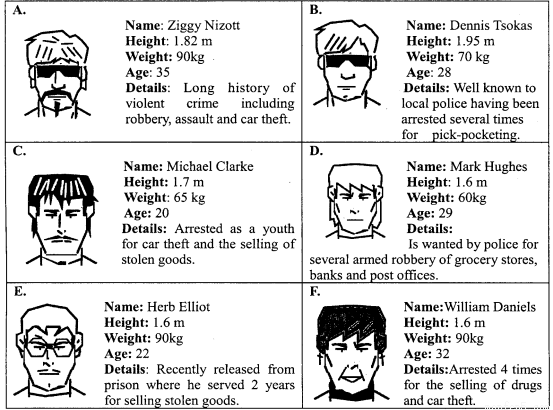题目内容
信息匹配 ( 本大题共5小题,每小题2分,共 10分)
首先请阅读下列警方通报查找人员的信息:

以下是相关事件及人物的描述,请把描述与相关插图及提示性文字匹配起来。
1.A valuable dog was taken while being walked by its owner in City Park yesterday afternoon. Police wish to talk to a man seen nearby at the time, described by witnesses as short and fat with short light hair and clear glasses.
2.Yesterday morning at 9.30a.m. a man armed with a gun entered the National Bank and demanded money from the staff, before fleeing when confronted by bank security staff. Security cameras show the man as being short and thin with shoulder length blonde hair.
3.A tall, strong built man with blonde hair, a thick black moustache and wearing dark glasses knocked a woman to the ground and stole her purse on Main Street last Saturday afternoon. If you see this man, do not approach as he is considered extremely dangerous.
4.At the football match between Manchester United and Liverpool, several people had their wallets stolen while waiting in line to buy food. The victims did not see or notice the thief but bystanders describe him as very tall and thin, clean shaven with short light hair.
5.A car was stolen from the supermarket car park (停车场)on Friday, June 23 this year by a man described as very young, 1.7 meters tall with thin dark hair and carrying a blue backpack. A reward of $500 is offered for the car's recovery.
1.E
2.D
3.A
4.B
5.C
【解析】
试题分析:
1.段落大意:一只名贵的狗在昨天下午和主人在城市公园散步时被带走。 目击者称作案人又矮又胖、由作为短、留着光亮的短发和浅色的眼镜。 与E中人物的长相和细节描述相符:因为偷盗罪在监狱服刑2年,最近刚刚被释放。
2.段落大意:昨天上午 9:30 上午一名男子持枪闯入国家银行抢钱。摄像机显示该男子又矮又瘦,留一头齐肩的金发。与D中人物的长相和细节描述相符:持枪抢劫一些银行、商店和邮局。
3.段落大意:上周六下午在大街有一个又高又壮留金黄色的头发、粗壮的黑胡子,戴墨镜的男子撞倒一名女子,然后偷了她的钱包。如果你看到这个男人,不要靠近,他是个危险分子。与A中人物的长相和细节描述相符:抢劫、暴力侵犯和偷车罪。
4.段落大意:在曼联和利物浦之间的足球比赛期间,几人在排队买食物时他们的钱包被人偷了。受害者没有看到或注意到小偷,但旁观者描述他很高和瘦、 脸刮得很干净、短发。与B中人物的长相和细节描述相符:因为扒窃被捕数次。
5.段落大意:一辆车于今年6 月 23 日星期五在超市停车场被偷。有目击者称偷车人非常年轻,薄薄的黑头发,背着一个蓝色背包,是一个身高 1.7 米的男子。赏金500 美元找车。与C中人物的长相和细节描述相符:曾因偷汽车卖赃物被捕。
考点 信息匹配。

 寒假创新型自主学习第三学期寒假衔接系列答案
寒假创新型自主学习第三学期寒假衔接系列答案